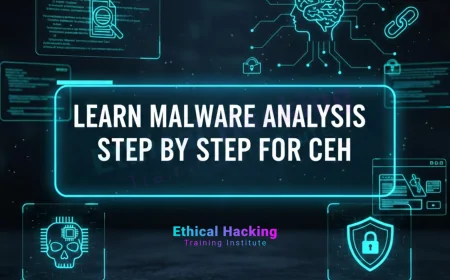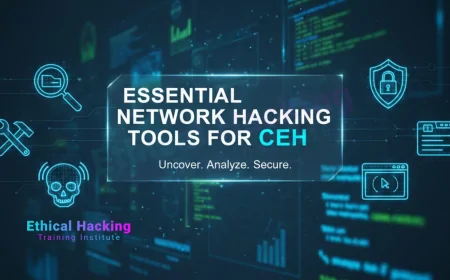CEH Training: The Key to Unlocking a Career in Ethical Hacking | How CEH Training Opens Doors in the World of Ethical Hacking
Discover how CEH training can unlock your career in ethical hacking. Learn about the CEH course syllabus, tools, job roles, exam details, and top training providers in India.

Table of Contents
- Introduction
- What is CEH?
- Why CEH is Crucial for a Hacking Career
- What’s Covered in CEH Training
- Top Skills You’ll Gain
- Popular Tools You’ll Learn
- Hands-On Lab Training
- CEH Exam Structure
- Career Opportunities After CEH
- Who Should Pursue CEH Training?
- Training Modes: Online vs Classroom
- Duration and Cost of CEH Training
- How to Prepare for the CEH Certification
- CEH vs Other Certifications
- Global Recognition of CEH
- Top CEH Training Providers in India
- How CEH Training Prepares You for Real-World Threats
- Advanced Courses After CEH
- FAQs
- Conclusion
Introduction
Ethical hacking is one of the most in-demand skills in the cybersecurity industry. As cyberattacks grow in sophistication, companies across the globe are hiring ethical hackers to safeguard their data and systems. CEH training (Certified Ethical Hacker) provides a gateway for aspiring professionals to master ethical hacking techniques using industry-standard tools and methodologies.
What is CEH?
CEH is a globally recognized certification offered by the EC-Council. It trains individuals in identifying vulnerabilities and weaknesses in computer systems while using the same tools as malicious hackers—but legally and ethically. CEH is one of the first stepping stones toward a lucrative and impactful cybersecurity career.
Why CEH is Crucial for a Hacking Career
The Certified Ethical Hacker (CEH) certification is not just another cybersecurity credential—it's the foundation of a professional ethical hacker's toolkit. Here's why CEH is essential for anyone serious about building a successful and credible career in ethical hacking:
1. Global Recognition and Industry Trust
CEH is issued by the EC-Council, a globally respected certification body. It’s recognized by:
-
NSA (National Security Agency)
-
Department of Defense (DoD, USA)
-
Fortune 500 companies
-
Government and defense agencies worldwide
Holding a CEH badge proves you're trained, tested, and trustworthy.
2. Develops a Hacker Mindset—Legally
CEH trains you to think like a hacker—but ethically. This offensive security perspective is vital in identifying loopholes and defending systems before malicious hackers do.
3. Covers a Wide Range of Cyber Attack Vectors
The course covers 21+ attack domains, including:
-
Footprinting
-
Malware analysis
-
Web app hacking
-
SQL injection
-
Cloud & IoT attacks
This breadth ensures you're ready for real-world scenarios across all platforms.
4. Hands-On Practical Skills with Real Tools
You gain experience with 350+ industry-grade tools like:
-
Metasploit
-
Burp Suite
-
Nmap
-
Wireshark
CEH isn’t just theory—it includes labs, challenges, and simulations that mirror real attacks.
5. Career Advancement and High Demand
Cybersecurity professionals with CEH certification are highly sought after in roles such as:
-
Ethical Hacker
-
Penetration Tester
-
Cybersecurity Analyst
-
Security Consultant
In India and globally, CEH-certified individuals can earn salaries ranging from ₹6 LPA to ₹25+ LPA, depending on experience.
6. Prerequisite for Advanced Certifications
CEH is often a required or recommended stepping stone for advanced courses like:
-
CHFI (Computer Hacking Forensics Investigator)
-
ECSA (Certified Security Analyst)
-
LPT (Licensed Penetration Tester)
7. Regulatory & Compliance Advantage
Having CEH-certified professionals helps organizations comply with:
-
ISO 27001
-
GDPR
-
HIPAA
-
PCI-DSS
This makes you a strategic asset in compliance-heavy sectors like finance, healthcare, and defense.
8. Credibility in Job Interviews and Freelance Projects
CEH proves your capability and integrity to employers, clients, and peers. It builds instant credibility in interviews, freelance cybersecurity consulting, and bug bounty programs.
9. Structured Learning for Beginners & Pros
Whether you're just starting or already in IT, CEH provides a structured path from basic concepts to advanced attack techniques, suitable for all skill levels.
In Summary
CEH is crucial because it’s not just a certification—it’s a career launcher.
It provides the skills, credibility, tools, and recognition you need to excel in ethical hacking. If your goal is to become a cybersecurity defender or red team expert, CEH is your first and most essential step.
What’s Covered in CEH Training
The CEH course is divided into multiple modules covering key areas:
- Introduction to Ethical Hacking
- Footprinting and Reconnaissance
- Scanning Networks
- Enumeration
- System Hacking
- Malware Threats
- Social Engineering
- Denial-of-Service Attacks
- Session Hijacking
- Web Application Hacking
- SQL Injection
- Cloud and IoT Security
Top Skills You’ll Gain
By completing CEH training, learners acquire:
- Offensive penetration testing tactics
- Network security analysis
- Exploit development basics
- Understanding of vulnerabilities and zero-day threats
- Use of reconnaissance and scanning tools
Popular Tools You’ll Learn
CEH teaches how to use 350+ hacking tools including:
- Nmap – Network scanning
- Metasploit – Exploitation framework
- Wireshark – Network packet analyzer
- Burp Suite – Web vulnerability scanner
- Aircrack-ng – Wireless cracking
Hands-On Lab Training
CEH includes virtual labs via EC-Council’s iLabs platform. These are real-time environments replicating enterprise networks, where students practice attack and defense scenarios. This hands-on experience is crucial for job readiness.
CEH Exam Structure
- Exam Code: 312-50 (EC-Council)
- Number of Questions: 125
- Time: 4 hours
- Format: Multiple Choice Questions (MCQs)
- Passing Score: 60–85% (varies by test form)
Career Opportunities After CEH
CEH opens doors to multiple cybersecurity roles, including:
- Ethical Hacker
- Security Analyst
- Penetration Tester
- Security Consultant
- Vulnerability Assessor
Who Should Pursue CEH Training?
- IT professionals seeking cybersecurity specialization
- Graduates interested in ethical hacking
- Network administrators and system engineers
- Security officers or consultants
Training Modes: Online vs Classroom
- Online (Self-paced or Live): Flexible and convenient
- Classroom: Structured learning with peer interaction
- Hybrid: Best of both formats with recordings
Duration and Cost of CEH Training
- Duration: 40 to 60 hours
- Cost in India: ₹25,000 – ₹65,000 depending on mode
- Exam Fee: ₹30,000 – ₹35,000 (included or separate)
How to Prepare for the CEH Certification
- Join EC-Council-accredited training
- Practice in iLabs regularly
- Take mock exams
- Read the official CEH exam blueprint
CEH vs Other Certifications
| Certification | Focus |
|---|---|
| CEH | Ethical hacking & offensive security |
| CompTIA Security+ | Foundations of cybersecurity |
| OSCP | Advanced penetration testing |
| CHFI | Digital forensics |
Global Recognition of CEH
CEH is recognized by top bodies like:
- NSA (National Security Agency)
- DoD (Department of Defense, USA)
- ANSI Accreditation
- Cybersecurity employers globally
Top CEH Training Providers in India
- WebAsha Technologies
- Simplilearn
- InfosecTrain
- Koenig Solutions
- Bytecode Security
How CEH Training Prepares You for Real-World Threats
CEH equips you to think like a hacker, uncover vulnerabilities, and implement remediation strategies. With real-world attack simulations, you’re ready to face cyber threats in real jobs, not just theory.
Advanced Courses After CEH
- CEH Practical
- ECSA (Certified Security Analyst)
- CHFI (Computer Hacking Forensics Investigator)
- LPT Master (Licensed Penetration Tester)
FAQs
1. What is CEH training?
It is a cybersecurity course that teaches ethical hacking techniques and prepares you for CEH certification.
2. Who provides CEH certification?
CEH is offered by EC-Council (International Council of E-Commerce Consultants).
3. What are the prerequisites for CEH?
Basic networking and IT knowledge. Some experience is preferred but not mandatory if training is taken.
4. Is CEH training online?
Yes, it is available in both self-paced and live online formats.
5. What is the CEH exam fee?
Approximately ₹30,000 – ₹35,000 depending on the provider.
6. Is CEH worth it?
Yes, it’s globally recognized and opens many job roles in cybersecurity.
7. How long does CEH training take?
About 4 to 6 weeks depending on the learning mode.
8. What tools are covered in CEH?
Tools like Metasploit, Nmap, Wireshark, Burp Suite, and more.
9. Can CEH be done without coding?
Yes, basic scripting helps but is not mandatory.
10. Does CEH include practical labs?
Yes, via iLabs or other virtual labs.
11. What is the passing score for CEH?
Varies between 60% to 85% based on the exam form.
12. What comes after CEH?
Advanced courses like ECSA, LPT Master, or CHFI.
13. Is CEH valid worldwide?
Yes, CEH is globally recognized.
14. Can I get a job after CEH?
Yes, roles like penetration tester, ethical hacker, and analyst are common.
15. What are CEH iLabs?
They are virtual labs for hands-on ethical hacking practice.
16. Is CEH hard to pass?
With proper training and practice, it’s achievable.
17. Which institute is best for CEH?
WebAsha Technologies, Koenig, Simplilearn, etc., are popular in India.
18. Is there an age limit for CEH?
No specific age limit, but 18+ is recommended.
19. Do I need a degree to do CEH?
No, but basic IT knowledge is helpful.
20. Is CEH required for cybersecurity jobs?
It’s not mandatory, but highly valued by employers.
Conclusion
CEH training is the foundation of a successful ethical hacking career. With the rise of cybercrime, skilled professionals are needed more than ever. CEH not only validates your skills but empowers you to protect digital infrastructures in a legal, ethical, and impactful way. Whether you're an IT graduate, a tech professional, or a cybersecurity aspirant, CEH is your key to unlocking a high-potential future.
What's Your Reaction?
 Like
0
Like
0
 Dislike
0
Dislike
0
 Love
0
Love
0
 Funny
0
Funny
0
 Angry
0
Angry
0
 Sad
0
Sad
0
 Wow
0
Wow
0

















